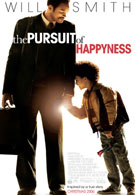Is there anything that Will Smith can’t do? He has survived Bel-Air, saved the world from an alien invasion and captured the essence of boxing great Muhammed Ali. He’s even managed to stay out of the tabloids, while his high-caliber peers get ruthlessly hounded by the paparazzi.
With Pursuit of Happyness, Smith takes on a truly challenging role and shines once again; he is, hands down, the best thing about the movie. Starring alongside his adorable 8-year-old son, Jaden, he turns in a raw, heartbreaking performance as a man who struggles to give his child the quality life that escaped him—surmounting a lack of education, stubborn naysayers and homelessness to become a rags-to-riches phenomenon.
But, as we know, very few homeless people will go on to become Chris Gardner, the man whose struggles in the early ‘80s inspired the movie. The Pursuit of Happyness, otherwise known as the arch-rival of Microsoft’s spell check, ultimately cracks under the weight of its hefty ambitions by never realizing when enough is enough.
In the story, Gardner (Smith) is a salesman with an ample supply of bone density scanners collected during an ill-conceived investment plan that has yet to pay off. His girlfriend, Linda (Thandie Newton), is fed up with having to work double shifts while he strolls around town holding these strange devices, only to return by nightfall with a skinny wallet. They have a son together (Jaden) who spends a lot of time in day care watching TV reruns. Point blank, they are going nowhere fast.
When money woes are pushed to the breaking point, Linda decides it’s time to go. Are we really supposed to believe that she would just abandon her son, who she seems to care about, and leave him in the hands of someone she deems a loser? There is absolutely nothing in the film to suggest that she is mentally unstable or would disappear without her child—except that it sets up a convenient launching pad to paint Chris as a victim.
It’s also hard to believe that while wearing bum clothes and sporting a paint-smeared face, Chris would land an internship at a prestigious brokerage firm on sheer wit alone. While the film is based on a true story—or, rather, “inspired by a true story,” which means barely resembling what actually occurred—you shouldn't have to get a lobotomy to enjoy it.
For a movie to be inspiring, you have to fully believe the hero’s plight. You have to be right there with him, standing on the sidelines and cheering until he marches to glory with his head held high. Pursuit of Happyness never really allows that because it values emotion over common sense, sentimentalism over logic. It’s a “real” story, but it feels like it was chewed up and spit out by the Hollywood machine.
Will Smith saves the flailing film by being the only honest thing about it. It’s worth seeing just to study the pitch-perfect nuances of his performance, most evident in a scene where he and his son are sleeping in a public bathroom and tears fall out of his eyes without any strain. Thankfully, he rises above the underdeveloped screenplay by Steve Conrad (The Weather Man), a writer who is great at showing misery but not as great at justifying the suffering. Smith also makes the most of Gabriele Muccino’s English-language directorial debut, but something clearly gets lost in translation.
As for the movie title’s oddly-spelled “happyness,” the word is painted that way on the outside of a day care center and it inspires Chris to contemplate whether happiness truly exists. For him, it does; for millions of other homeless people, it never will. That is a reality too depressing to be alleviated by a movie—and it just may be the one thing that even Will Smith can’t do.











